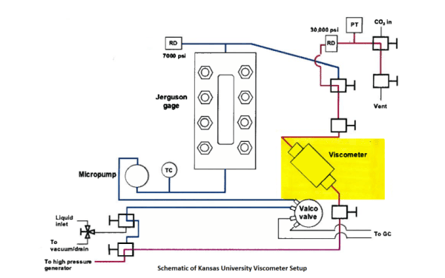
Boston—Researchers at the University of Kansas’ Center for Environmentally Beneficial Catalysis (CEBC) and the Transportation Research Institute (TRI) are studying the viscosity of biodiesel to explore the effect of temperature, pressure and vegetal source on the viscosity of biodiesel. Biodiesel, as an alternative fuel, has undergone significant research, development and large-scale distribution over the past few years. However, very little research has been conducted on the viscosity change that biodiesel would undergo in a fuel injector that would be up to several hundred percent greater than the ambient-pressure viscosity.
Using a Cambridge Viscosity High Pressure Viscometer: ViscoLab PVT, researchers measured the viscosity for five different types of biodiesel under high pressures (up to 130MPa) and at four temperatures (283.15, 298.15, 313.15, and 373.15 K). The five biodiesel samples were derived from a variety of sources, including two types of soybean oil, fresh canola oil, canola oil initially used as a cooking oil, and coconut oil.
Previously, researchers used falling ball or falling cylinder sensor technology, which was time consuming and did not allow for engine pressure conditions. Associate Professor of Chemical and Petroleum Engineering Aaron M. Scurto, PhD, says the ViscoLab PVT “has enabled us to really understand what happens to biodiesel inside an engine injector, accounting for the effects of pressure and temperature. The Cambridge sensor has helped us obtain superior data by directly measuring viscosity under these conditions.”
The study is timely in light of emerging renewable fuel standards. The EPA requires that the volume of renewable fuel blended into transportation fuel be increased from 9 billion gallons in 2008 to 36 billion gallons by 2022. As an alternative fuel, biodiesel has many advantages over petroleum-based fuels, including low particulate emissions and high-energy content, and can be used in conventional compression-ignition (diesel) engines with relatively little or no modification.
By having a better understanding of the viscosity of the fuel at high pressure, engine designers can properly correct for changes in line dynamics and the impact on fuel injection timing and amount in the engine. This will allow for more robust, flexible engine designs that can accommodate emerging biofuel technologies, while achieving lower emissions and higher performance. The research may also help engine designers formulate a universal injector suited for temperature, pressure and fuel conditions, accounting for varying viscosity data across a wide array of biodiesels.
To read more about their research, purchase the entire article from Kansas University.
About Cambridge Viscosity
Cambridge Viscosity, a leader in small sample viscometer systems for laboratory and process environments, designs automated viscometers used worldwide in petroleum, exploration and refining applications to ensure accurate viscosity in both lab and operations. Cambridge’s worldwide reach is important for providing application engineering support and service wherever and whenever needed. Cambridge Viscosity’s sensors and viscometer systems conform to ASTM, DIN, JIS and ISO standards, with a range of models designed to meet specific industry and application needs.
About CEBC
Researchers at the Center for Environmentally Beneficial Catalysis partner with industry experts to create clean technologies for making chemicals and fuels. With investments of more than $26 million, CEBC is accelerating the discovery of manufacturing processes that will meet society’s growing needs while protecting the environment and human health.





